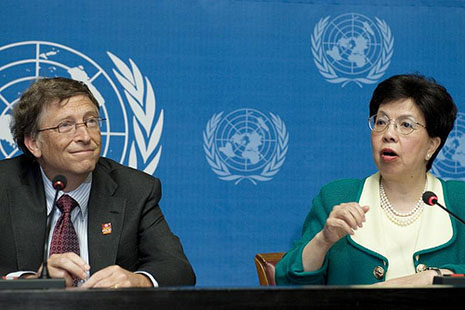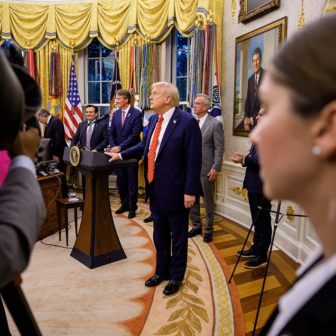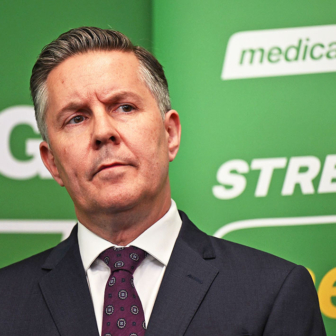THE view of the Swiss Alps from the meeting rooms of the World Health Organization in Geneva is expansive and inspiring. A short bus ride from the city centre, the WHO building conveys a sense of grand intention and vision.
I was first here in the late 1970s, as part of an international research program documenting the frequency of heart disease and stroke, and risk factors such as smoking and cholesterol, in countries as diverse as Finland and China. Now, forty years later, the world is beginning to take the global reach of heart disease seriously. The United Nations has convened a meeting in New York this month about heart disease and other long-term lifestyle problems, such as diabetes. WHO worries about the world.
Since its birth on 7 April 1948 as an agency of the United Nations aiming for “the attainment by all people of the highest possible level of health,” the WHO has embodied the hope and optimism associated with global rebuilding after the second world war. It has overseen the conquest of smallpox. It has saved millions of lives with simple, workable ways to rehydrate children desperately ill with diarrhoea. It has brought order to the management of global influenza and SARS epidemics. It has nearly beaten polio. It is one of the United Nation’s most successful children.
Each year the nations of the world gather in Geneva for the World Health Assembly to consider, complain, cajole and carry on. With hundreds of national voices competing to be heard, you can’t do anything through the WHO unless you do the politics. But the nations do turn up. While the WHO is in some financial strife – paying its costs and salaries in Swiss francs, while receiving revenue in American dollars – somehow it keeps going.
From time to time, the WHO has been trumped by the Gates Foundation, the World Bank, even its parent body the United Nations, but still, like a long-suffering and caring mother in a fable, it perseveres. If you want to secure a multilateral international program in health you must go through the WHO – there is no other show in town.
But is the WHO well-equipped for future challenges? The pressures of global health problems are increasing, heated by global economic problems associated with the recent and prolonged global financial crisis, and the expanding epidemics of chronic diseases such as diabetes among the poor. Well over one billion people remain trapped in abject poverty, with next to no healthcare and victim to food insecurity, infectious diseases and, now, the additional ravages of chronic non-communicable disease as fast food and tobacco spread like spilt ink on the global page.
Margaret Chan, the director-general of the WHO, recognises that change is needed. At this year’s World Health Assembly, she said:
When WHO was dealing mainly with germs, hygiene, medicines, vaccines and sister sectors, like water supply and sanitation, our job was much more straightforward. But that job has changed, gradually over time and then dramatically within the past decade…I see a new WHO that works with other sectors to address health risks that threaten the health and stability of societies, and a new WHO where all countries, small or big, rich or poor, come together to defend equity, social justice, and human rights…
I invite you to join me on this journey of reaffirmation, remembrance, reform, and revitalization!
But despite Chan’s upbeat tone, there is no justification for a touching belief that the WHO’s survival is an evolutionary triumph in the face of natural selection. Indeed, many warn that it resembles nothing so much as a dinosaur on the edge of the Ice Age, only in this case it will be the Age of Global Warming and the age of the lifestyle-associated non-communicable pandemics that cannot be stopped by an immunising needle, quarantine or medicine.
Professor Larry Gostin, an eminent public health law and ethics academic from Georgetown University in the United States, argues that the WHO needs a radical reinvention of function and capacity in the face of physical and environmental upheaval. He proposes five areas for action, which I think are worth considering, given that Australia is among the few affluent countries that are in a position to act.
1. Increase the voice of stakeholders. Gostin argues that “the WHO would be more effective by giving voice and representation to key stakeholders, including philanthropies, businesses, public/private partnerships, and civil society. While actively engaging with the private sector, the WHO should also set standards for and ensure compliance of key private partners such as the food, pharmaceutical, and biotechnology industries.”
I find the complexity of this challenge rather daunting. I can see the merit in bringing these other stakeholders into the applied work of the WHO, but I am less certain about the side effects if the national representative nature of the World Health Assembly is seriously perturbed.
Australia could certainly argue for a stronger representation of the stakeholders in strategies to confront the challenges of chronic disease and in the development of effective health systems in developing countries – one of the most desperate global health deficits.
2. Increase transparency and accountability. Here Australia is not on strong ground, though it is firming up. Three years ago, when the former federal health minister Neal Blewett launched Australia’s Health 2008, he commented that statistics on the performance of the multibillion-dollar health system and the outcomes that it was achieving were conspicuously absent from the report. Compared with healthcare systems in the United States, the United Kingdom and parts of Europe, our ability to say what we get in return for what we put in is quite limited.
But we understand the problem and, as business also moves down the same path, Australia could be strongly supportive of the WHO’s publishing more about where the money goes and what it achieves.
3. Regain control over the regions. The problem here is the fact that the six WHO regions – Africa, the Americas, South-East Asia, Europe, the Eastern Mediterranean and the Western Pacific – have become highly autonomous. One person I spoke with – speaking from considerable experience of the WHO – said that they had become “six separate WHOs.”
While the principle of subsidiarity often makes humane and efficient sense, it can lead to uneven performance. If each instrument in a sextet is not in harmony, the result is cacophony. If they all sound exactly the same, the result is monotony. This is a hard one to get right. In New South Wales, for example, we are in a phase of increasing decentralisation, having had a six-year stint of centralisation after previous decentralisation. Watch this space.
Australia can assist by ensuring that its participation in regional WHO activities diplomatically recognises the importance of keeping the head office on side and in the loop. This may need to be done against opposition, but if we are clear, as a nation, about preserving the WHO as a truly global organisation, then we should be prepared to assert a position consistent with that when it comes to regional versus international authority.
4. Establish legal authority. Australia has been a supporter of and is a signatory to the Framework Convention for Tobacco Control, or FCTC, one of the WHO’s two formal treaties. This is an excellent beginning, but although making this treaty effective has been a tough struggle, it was in fact a fight in a well-groomed sandpit.
The tobacco companies are so blatantly egregious, their product so hopelessly unhealthy, and public attitudes towards them so negative that the FCTC is a pushover compared with promulgating treaties around food security or minimum standards for healthy urban development.
As our colleagues in international law would rightly be quick to remind us, we have a long way to go in winning global support even for the rule of law in general, let alone any of its particulars.
We might say, incorrectly, that getting agreement on health is surely easy, because everyone values it. Well, of course they don’t. Many nations value lots of things ahead of health, and seeking to bring them into a health legal framework is not easy. But Australia could ensure that it supports efforts inside the WHO to strengthen its legal capacity, and supports fledgling steps towards the appropriate promulgation of international health-related law.
5. Ensure predictable, sustainable financing. Well, yes, why not? In Australia, health expenditure grinds along – as John Deeble, one of the two architects of Medicare, says – climbing by 8 per cent a year whatever reforms are introduced and whatever reorganisations are enacted.
One local health district in Western Sydney with a population of about 800,000 people spends over $1 billion each year on hospital and community care; the WHO’s principal budget is only twice that size.
Australia has a thoroughly predictable and thus far sustainable financial arrangement. Those of us who work in the system and are concerned with budgets wonder how we will survive another year, but we do. The one key thing Australia can do for the WHO is to continue to pay its dues.
I sympathise with the WHO director-general, who has increasingly obtained funding outside the budget to keep the ship afloat. Following a similar line, where would Australian universities be without overseas fee-paying students or local fee-payers?
As the chief executive of an organisation threatened with extinction, you have to go where the money is. Massive currency depreciations cannot otherwise be managed. This is not to gainsay efficiency drives, but it’s hard to know what Australia can do to encourage the United States and other nations to meet their dues or to strengthen the resolve of the WHO to remain on its principal course. If you accept money from other sources it will inevitably and quite properly alter your direction. This is a very tough one indeed.
AUSTRALIA can help the WHO reform. Australia tends to think of itself as small and of no influence, but we are a privileged and very powerful minority on the international stage. We should take every chance to ensure that the WHO achieves its original grand objectives of leading the world into an unprecedented era of good health.
We have the resources and we have the necessary knowledge. As with climate change, we now need the political leadership and public commitment to achieve our goals. •




